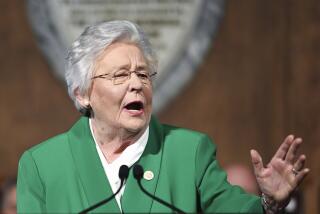UAW’s Focus in ’99 Contract Talks to Be Job Security
- Share via
DETROIT — With new manufacturing technology threatening union ranks, the United Auto Workers said Wednesday that protecting and creating jobs will be its top focus in contract negotiations that begin next month with U.S. auto makers.
UAW President Stephen Yokich said the union has “serious issues” with each of the nation’s three major auto makers: General Motors Corp., Ford Motor Co. and DaimlerChrysler.
“Job security is the No. 1 issue,” he said in a press briefing.
Though not a new rallying cry for the UAW, the issue has taken on a different hue this year with the union facing new challenges to maintain its membership. The UAW must contend with auto makers’ use of modular assembly that requires fewer workers to build more cars, increased contracting to outside suppliers, and a growing reliance on overtime rather than new hires to meet production demands.
The union’s relations with GM continue to be strained, though slightly improved, since the 54-day strikes last summer that cost the company more than $2 billion in profit.
But Yokich said the UAW also has significant differences with Ford and DaimlerChrysler and would not hesitate to call strikes against them if national contract agreements can’t be hammered out amicably this fall.
“I have no concern about striking any of the three,” he said, noting that the union’s strike fund exceeds $1 billion.
The contract talks, which open June 14-16, come as the auto industry is enjoying a prolonged period of robust sales and record profits. Still, the UAW is struggling to maintain its ranks of 396,000 high-paying auto jobs, up about 10,000 in the last three years.
As in the last negotiations in 1996, the UAW said it will not pick a target company but will negotiate simultaneously with all three. Sometime in the fall it will choose one of the companies with which to negotiate a final contract. That agreement will serve as a pattern for contracts to be worked out with the two others.
DaimlerChrysler is considered the least likely lead company because the merger that created it last year has left many unknowns. Analysts give Ford and GM equal shots at the lead role.
Ford, which has the best relations with the UAW of the major auto makers, went first in both 1993 and 1996. But GM might have a shot this year, because most of the contentious issues reside in its backyard.
“GM could be the focus company because it has so many outstanding issues: modularity, the Delphi spinoff and outsourcing,” said David Andrea, chief economist for CSM Worldwide, an auto consulting company.
In January, GM unveiled plans to build several small-car plants that would employ 40% fewer workers than the factories they would replace and reduce production costs by 20%. Mark Hogan, vice president of GM’s small-car group, said the plants could cut costs by $2,000 per vehicle.
The factories would use modular assembly, a process that relies on low-cost outside suppliers to design, build and install large components such as complete instrument panels.
The UAW, however, opposes the new projects. Yokich said at the UAW’s bargaining convention in March that “modularity” is just a code word for outsourcing.
GM officials quietly backed away from the project in recent months, but Hogan told an auto manufacturing conference Tuesday in Detroit that GM is moving forward with the new plants and is optimistic that it can reach an agreement with the UAW.
The comments incensed UAW leaders. Yokich said Hogan’s public comments are hindering negotiations and called for his firing.
“If they can’t fire him, they ought to muzzle him,” Yokich said.
GM spokesman Ed Snyder defended Hogan’s comments. He added that modularity is an issue under discussion with the union but that it is uncertain whether it will be decided as part of the national contract.
Analysts say competition is forcing the industry to build more efficient plants.
“The idea of moving work out of assembly is going to happen, and there is nothing the UAW can do to stop it,” said Mary Ann Keller, analyst with ING Barings Furman Selz.
The UAW is also upset with GM’s decision to spin off Delphi Automotive Systems, its giant parts unit. Yokich said Delphi workers remain under the current GM master contract and will be covered by the new contract.
Despite the union’s criticism of the company, Richard Shoemaker, the UAW’s top GM negotiator, said relations had improved under Gary Cowger, newly appointed as GM’s top bargainer. But Shoemaker cautioned that one man can’t change the relationship, noting: “It requires a cultural change.”
UAW officials said other major concerns are overtime and organizing suppliers and foreign-owned auto plants.
Yokich said that if U.S. auto makers were to cut back on overtime, they could hire 86,000 additional full-time workers--or more than the entire DaimlerChrysler UAW work force of 75,000.
The union also said it will demand that the auto makers be “good corporate citizens” and live up to contract clauses stipulating that they not oppose organizing of their plants or suppliers. A major contract issue with DaimlerChrysler will be allowing the UAW to organize the Mercedes-Benz plant in Alabama as well as Freightliner Corp., its North American heavy-truck subsidiary.






